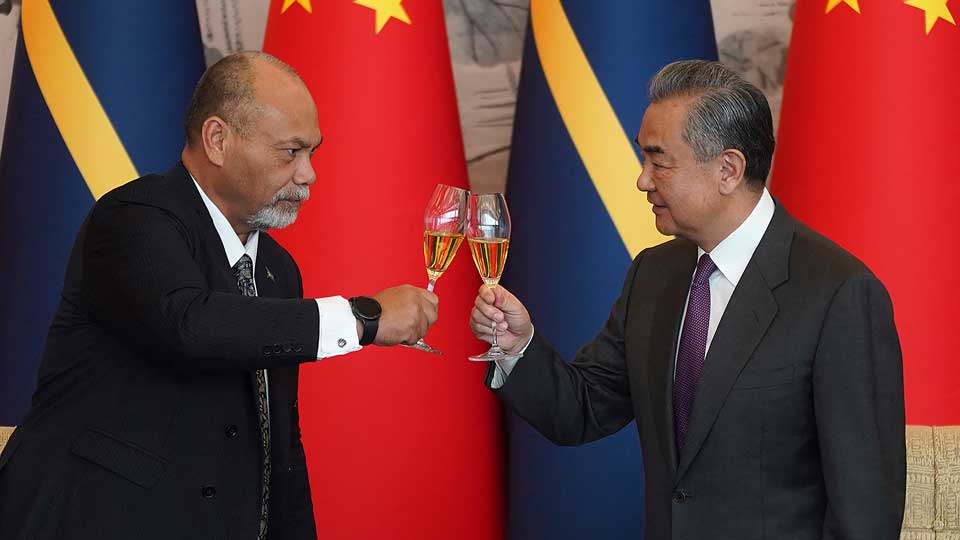
By Lukas Fiala & Kenddrick Chan
Among the many noteworthy consequences of Taiwan’s recent elections, Nauru’s recognition of the One China Principle is perhaps the most underappreciated one. Having announced the diplomatic switch from Taipei to Beijing shortly after election day, Nauru’s Minister of Foreign Affairs and Trade, Lionel Aingimea, formalized the re-establishment of diplomatic ties this Wednesday during a meeting with China’s chief diplomat and foreign minister, Wang Yi, in Beijing.
It’s easy to assess this situation from the perspective of great power politics. And yet, the episode demonstrates the importance of accounting not only for material but especially for symbolic power in China’s statecraft.
And the symbolism could hardly be stronger. Nauru’s President, Russ Joseph Kun, attended Taiwan’s National Day celebrations last October as a special guest, even meeting President Tsai Ing-wen and delivering the opening remarks at the Yushan Forum – a conference hosted by the Taiwanese government to encourage exchanges on policy issues. Both these events were attended by one of the authors, who recalls Nauru’s President stating the people of Nauru will always stand with the people of Taiwan.
By targeting Tsai’s special guest, Beijing has clearly sent a signal. Without firing a single bullet or even uttering harsh diplomatic language reminiscent of Wolf Warrior diplomacy, the Communist Party of China (CPC) leadership has sent a message to Taipei: We are demonstrating to you that we can isolate you if we so desire.
Taiwanese analysts and officials have, of course, long been aware of China’s strategy. Losing Nauru means losing a diplomatic partner with a sovereign voice in multilateral organizations. The key point to note, however, is the reputational element of this event, especially the major loss of ‘face’ for Taiwan resulting from China’s targeted approach.
We may call Beijing’s approach reputational statecraft: the use of diplomatic means to frame China as a rightful major power acting in line with its perceived legitimate interests in pursuit of CPC goals. Normative goals are underwritten by the party-state’s financial largesse, with Nauru’s switch reportedly linked to minimizing losses of around $80 million from the temporary closure of an Australian immigration processing facility.
Due to a more assertive diplomatic posture abroad and nationalism at home, the role of foreign policy in legitimating the CPC leadership has grown under Xi Jinping. From small gestures such as the handing over of Xi’s books on the governance of China to officials across the Global South to Chinese diplomats’ participation in high-level ceremonies hosted by foreign countries to thank China for its diplomatic support on regional issues, legitimating China’s role as a major power has become an increasingly important goal.
At the heart of this effort lies the ambition to project Xi’s image as a respected statesman and leader welcomed by foreign counterparts. For instance, on his 2022 trip to Kazakhstan, Xi received the Order of the Golden Eagle, reportedly the highest award in recognition of an individual’s contribution to Kazakhstan’s development and external relations. The fact that this was Xi’s first foreign trip after three years of COVID-induced diplomatic hibernation demonstrates the centrality of reputational statecraft in China’s foreign affairs.
Little though they seem, such gestures are an integral part of the daily practice of China’s diplomatic engagements across the Global South. Understanding their messages will help us develop a more nuanced analysis of China’s evolving global role.
Lukas Fiala is the Head of the China Foresight Project at LSE IDEAS and Kenddrick Chan is the Head of the Digital IR project at LSE IDEAS
